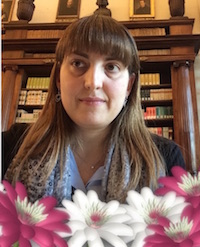Studying at the University of Verona
Here you can find information on the organisational aspects of the Programme, lecture timetables, learning activities and useful contact details for your time at the University, from enrolment to graduation.
Academic calendar
The academic calendar shows the deadlines and scheduled events that are relevant to students, teaching and technical-administrative staff of the University. Public holidays and University closures are also indicated. The academic year normally begins on 1 October each year and ends on 30 September of the following year.
Course calendar
The Academic Calendar sets out the degree programme lecture and exam timetables, as well as the relevant university closure dates..
| Period | From | To |
|---|---|---|
| I semestre (Lingue e letterature straniere) | Sep 30, 2019 | Jan 11, 2020 |
| II semestre (Lingue e letterature straniere) | Feb 17, 2020 | May 30, 2020 |
| Session | From | To |
|---|---|---|
| ESAMI LINGUE - sessione invernale | Jan 13, 2020 | Feb 15, 2020 |
| ESAMI LINGUE - sessione estiva | Jun 3, 2020 | Jul 25, 2020 |
| ESAMI LINGUE - sessione autunnale | Aug 24, 2020 | Sep 19, 2020 |
| Session | From | To |
|---|---|---|
| LAUREE LINGUE - sessione autunnale (a.a. 2018/19) | Nov 4, 2019 | Nov 9, 2019 |
| LAUREE LINGUE - sessione straordinaria (a.a. 2018/19) | Mar 30, 2020 | Apr 4, 2020 |
| LAUREE LINGUE - sessione estiva (a.a. 2019/20) | Jul 6, 2020 | Jul 11, 2020 |
| LAUREE LINGUE - sessione autunnale (a.a. 2019/20) | Nov 2, 2020 | Nov 7, 2020 |
| LAUREE LINGUE - sessione straordinaria (a.a. 2019/20) | Apr 7, 2021 | Apr 13, 2021 |
| Period | From | To |
|---|---|---|
| Festa Ognissanti (Lingue) | Nov 1, 2019 | Nov 1, 2019 |
| Sospensione delle lezioni | Nov 2, 2019 | Nov 2, 2019 |
| Vacanze di Natale (Lingue) | Dec 23, 2019 | Jan 6, 2020 |
| Vacanze di Pasqua (Lingue) | Apr 10, 2020 | Apr 14, 2020 |
| Festa della Liberazione (Lingue) | Apr 25, 2020 | Apr 25, 2020 |
| Festa del Lavoro (Lingue) | May 1, 2020 | May 1, 2020 |
| Sospensione delle lezioni | May 2, 2020 | May 2, 2020 |
| Festa del Santo Patrono (Lingue) | May 21, 2020 | May 21, 2020 |
| Sospensione delle lezioni | May 22, 2020 | May 23, 2020 |
| Festa della Repubblica (Lingue) | Jun 2, 2020 | Jun 2, 2020 |
| Vacanze estive (Lingue) | Aug 10, 2020 | Aug 15, 2020 |
Exam calendar
Exam dates and rounds are managed by the relevant Foreign Languages and Literatures Teaching and Student Services Unit.
To view all the exam sessions available, please use the Exam dashboard on ESSE3.
If you forgot your login details or have problems logging in, please contact the relevant IT HelpDesk, or check the login details recovery web page.
Should you have any doubts or questions, please check the Enrollment FAQs
Academic staff
 angela.albanese@univr.it
angela.albanese@univr.it
 benedetta.binacchi@univr.it
benedetta.binacchi@univr.it
 elisa.destro@univr.it
elisa.destro@univr.it
 alice.fiorentino@univr.it
alice.fiorentino@univr.it
 sara.paolini@univr.it
sara.paolini@univr.it
 alberto.scandola@univr.it
alberto.scandola@univr.it
 massimo.scotti@univr.it
massimo.scotti@univr.it
 silvia.zollo@univr.it
silvia.zollo@univr.it
Study Plan
The Study Plan includes all modules, teaching and learning activities that each student will need to undertake during their time at the University.
Please select your Study Plan based on your enrollment year.
1° Year
| Modules | Credits | TAF | SSD |
|---|
1st foreign language2nd foreign language1st foreign literature2nd foreign literature1 module to be chosen between2° Year activated in the A.Y. 2020/2021
| Modules | Credits | TAF | SSD |
|---|
1st foreign language2nd foreign language1st foreign literature2nd foreign literature1 module to be chosen between the following3° Year activated in the A.Y. 2021/2022
| Modules | Credits | TAF | SSD |
|---|
1st foreign language2nd foreign language1st foreign literature2nd foreign literature1 module among the following (philology related to 1st or 2nd foreign language)1 module to be chosen between the following| Modules | Credits | TAF | SSD |
|---|
1st foreign language2nd foreign language1st foreign literature2nd foreign literature1 module to be chosen between| Modules | Credits | TAF | SSD |
|---|
1st foreign language2nd foreign language1st foreign literature2nd foreign literature1 module to be chosen between the following| Modules | Credits | TAF | SSD |
|---|
1st foreign language2nd foreign language1st foreign literature2nd foreign literature1 module among the following (philology related to 1st or 2nd foreign language)1 module to be chosen between the following| Modules | Credits | TAF | SSD |
|---|
Legend | Type of training activity (TTA)
TAF (Type of Educational Activity) All courses and activities are classified into different types of educational activities, indicated by a letter.
English literature 2 (2020/2021)
Teaching code
4S002927
Teacher
Coordinator
Credits
9
Language
English
Scientific Disciplinary Sector (SSD)
L-LIN/10 - ENGLISH LITERATURE
Period
I semestre (Lingue e letterature straniere) dal Sep 28, 2020 al Jan 9, 2021.
Learning outcomes
The module, taught in English, is meant to guide the students through a critical approach to the English Literature of the period going from the Restoration to late Romanticism, especially in relation to a representative range of texts of the canon. Besides, it aims at getting the students familiar with fundamental tools necessary for text analysis and genre criticism. Its overall gaol is to provide the students with a good knowledge of the British literature of the set literary period (its historical context, its texts, genres, movements/authors) and of helping them develop skills for analysis, argumentation and exposition in English, in relation to various typologies of literary texts in their historical-cultural context. At the end of the module, students will be able to: -analyze the literary texts set in the syllabus in their historical-cultural contexts; -argumentatively discuss them by taking into account literary conventions and by applying an informed critical approach that is aware of the literary nature of the text; -demonstrate the acquired knowledge and skills, in English and in a clear and consistent way.
Program
"Rebels, revolutionaries or patriots? Representing Jacobites between the 18th and the 19th centuries"
Jacobitism was a political movement in Great Britain and Ireland that between 1688 and 1746 aimed to restore the Roman Catholic Stuart dynasty to the thrones of England, Scotland and Ireland. A series of Jacobite ‘risings’ (or ‘rebellions’?) challenged the British Government in this period, and deeply unsettled British and Irish political/social life. The course will focus on a selection of literary representations, among the many the characterise 18th and 19th British literature, focusing on the work of two highly original and influential writers — Walter Scott and James Hogg.
Set books:
Jerome De Groot, The Historical Novel, Routledge
Walter Scott, Waverley. (One of the two following editions: Oxford University Press; Penguin)
James Hogg, The Three Perils of Woman, Edinburgh University Press.
Students will have to register with the e-learning website (Moodle) and download class materials on a regular basis.
This syllabus will be valid for two years (until January/February 2023)
Students who are unable to attend ("non frequentanti") will have to replace lecture notes with:
- from The Edinburgh Companion to Sir Walter Scott (Robertson, Fiona ed.) (available in the University Library):
Chapter 4, Scott’s Jacobitical Plots
Chapter 5, History and Historiography
Chapter 8 Romancing and Romanticism
- from The Edinburgh Companion to James Hogg (eds. Ian Duncan, Douglas S. Mack) (available in the University Library):
Introduction: Hogg and his Worlds
Chapter 8. Hogg and Nationality
Chapter 14. Hogg and the Novel
| Author | Title | Publishing house | Year | ISBN | Notes |
|---|---|---|---|---|---|
| Jerome de Groot | The Historical Novel | Routledge | 2010 | ||
| James Hogg | The Three Perils of Woman | Edinburgh University Press | 2002 | ||
| Walter Scott | Waverley | Penguin (Classics) | 2014 |
Examination Methods
Oral exam in English, which will assess:
- a knowledge of primary and secondary texts
- the ability to articulate effectively the information and critical assessments concerning texts and topics discussed in class.
Type D and Type F activities
To discover all the teaching activities accredited by the foreign teaching college click here
Career prospects
Module/Programme news
News for students
There you will find information, resources and services useful during your time at the University (Student’s exam record, your study plan on ESSE3, Distance Learning courses, university email account, office forms, administrative procedures, etc.). You can log into MyUnivr with your GIA login details: only in this way will you be able to receive notification of all the notices from your teachers and your secretariat via email and soon also via the Univr app.
Student login and resources
Gestione carriere
Assegnazione tutore
Attività accreditate D/F
Calendario didattico dettagliato
Cambio lingua curriculare
Competenze informatiche
Competenze linguistiche (prima e seconda lingua)
Competenze linguistiche in triennale (terza lingua CFU F)
Compilazione del piano didattico
Corso di Lingua portoghese
Erasmus+ e altre esperienze all'estero
Linguistic training CLA
Presentazione dei corsi di studio e Open day
Graduation
Saperi minimi
Stage e tirocini
Le attività di stage sono finalizzate a far acquisire allo studente una conoscenza diretta in settori di particolare interesse per l’inserimento nel mondo del lavoro e per l’acquisizione di abilità professionali specifiche.
Le attività di stage sono svolte sotto la diretta responsabilità di un singolo docente presso studi professionali, enti della pubblica amministrazione, aziende accreditate dall’Ateneo veronese.
I crediti maturati in seguito ad attività di stage saranno attribuiti secondo quanto disposto nel dettaglio dal “Regolamento d’Ateneo per il riconoscimento dei crediti maturati negli stage universitari” vigente.
- Tutte le informazioni in merito agli stage per futuri studenti sono disponibili alla pagina Stage e tirocini.
- Tutte le informazioni in merito agli stage per studenti iscritti sono pubblicate in MyUnivr - come fare per - stage e tirocini.
- Tutte le informazioni in merito agli stage per le aziende sono disponili alla pagina Stage e tirocini per azienze.
Ulteriori informazioni al seguente link https://www.univr.it/it/i-nostri-servizi/gestione-carriere-studenti-lingue-e-letterature-straniere/stage-e-tirocini-lingue-e-letterature-straniere


 +39 045802 8409
+39 045802 8409
















































